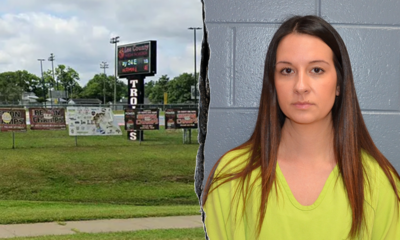North Carolina
NC legislators continue to ignore teacher vacancy crisis • NC Newsline

In 2023 state policymakers were confronted with alarming data: teacher vacancies had hit record highs. Not only did 1 in every 18 classrooms lack a licensed teacher, but districts serving the greatest share of Black students and students from families with low incomes faced the greatest shortages. In other words, the teacher shortage had reached crisis levels, demanding a dramatic response from lawmakers.
Sadly, that response never came. Now the teacher vacancy problem has gotten worse.
At the 40th day of the 2023-24 school year, 6,006 classroom teaching positions were vacant, smashing the prior year record by 18 percent. This year, more than 1 in every 16 lacked a licensed teacher over a month into the school year.
These vacancies continue to be associated with the demographics of the district. Districts with more students from families with low incomes and districts with more Black students tend to experience higher teacher vacancy rates. The association has grown even more stark this year.
As a result, it’s disproportionately Black students and economically disadvantaged students who pay the price for lawmakers’ unwillingness to make the necessary investments to attract and retain certified teachers in every classroom.
Of course, all students suffer from teacher vacancies. And it’s not just the students assigned to an unlicensed teacher.
Teacher vacancies increase the demands on the teachers who have persisted in spite of state policymakers’ efforts to drive them from the classroom. Vacancies create larger class sizes. They require experienced teachers to assist untrained, novice teachers and to fill in when substitutes are nowhere to be found. This leaves our best teachers with less time to lesson plan, individualize instruction, assist less experienced colleagues, or to find regular opportunities to decompress from an increasingly difficult, stressful job.
As vacancies rise year after year, an increasing number of teachers are taking on more responsibilities to fill in the holes.

It should come as no surprise that North Carolina’s teacher vacancy problem has worsened. The 2023 budget failed to include any meaningful efforts to reverse the ongoing war on the teaching profession. In spite of the teacher shortage crisis, legislators cut public school budgets and provided meager pay raises of only 3.6 percent, barely keeping pace with inflation. Average teacher pay is 23 percent below the national average. Our schools remain among the worst-funded in America and our teachers continue to earn salaries that dramatically trail their peers in other industries.
Legislators know that teachers remain the most important in-school factor for boosting academic achievement. Yet they have instead chosen to prioritize a massive expansion of the state’s private school voucher program to benefit wealthy families already enrolled in private schools. While investments in teachers have been shown to boost academic performance, statewide voucher programs have produced unprecedented drops in test scores for voucher students.
The voucher expansion also sends a clear message to public school teachers: state leaders would rather subsidize their wealthy donors than provide teachers with competitive salaries, repair dilapidated school buildings, or give teachers adequate support staff such as teacher assistants, nurses, and school psychologists.
Legislators’ failure to support teachers and improve their working conditions is at the heart of the long-running Leandro court case which requires that all children have access to highly qualified teachers. The case has spurred a detailed, research-based, multi-year plan to increase investments in educators and students in order to provide the basic level of schooling promised under our state constitution. Unfortunately, legislative leaders have fought tooth and nail to get the plan thrown out by the courts, sending educators (and students) another clear message: they’re uninterested in making things better.
The legislature has further conveyed their contempt for teachers by continuing to meddle in how teachers can do their jobs. The Parents Bill of Rights creates purposefully ambiguous restrictions on how teachers approach subjects related to sexual identity and limits their ability to support trans students or others exploring their gender identity. The bill also allows bad actors to file frivolous information requests and objections to instructional materials, chilling instruction on controversial subjects while also wasting teachers’ limited time and resources.
Other bills targeting teachers’ instructional practices could be revived this year. For example, HB 187, which seeks to create a chilling effect around an honest teaching of history and current events, is awaiting action in the state senate. Additionally, a major candidate for Governor has conducted his own witch hunt of teachers – seeking and failing to find “indoctrination” – and has referred to educators as “wicked people.”
Is it any wonder that teacher vacancies continue to rise?
It doesn’t have to be this way. There are several obvious steps that the legislature could take to attract and retain excellent, well-trained professionals in every classroom:
- Large, across-the-board pay raises
- Proper staffing levels for support staff such as teacher assistants, psychologists, nurses, counselors, and social workers
- Capital improvements to ensure each school offers a healthy, inviting learning environment
- Restoration of professional development and early career mentoring funds
Not coincidentally, these are all elements of the Leandro Plan.
If legislators want to address the teacher vacancy crisis, they can implement these evidence-based policies. But if they’d rather erect barriers to make academic success more difficult for Black students and students from families with low incomes, then they can continue their current strategy of undermining and alienating educators.

North Carolina
2026 primary turnout report released for eastern NC counties; see your county’s numbers

Here are the voter turnout numbers for the 2026 primary election, according to the North Carolina State Board of Elections.
Hyde County had the highest voter turnout, while Onslow County had the lowest turnout. Check out what the voter turnout in your county was below:
BERTIE COUNTY
Ballots Cast:
31.85% (3,911 out of 12,280)
CARTERET COUNTY
Ballots Cast:
29.06% (16,543 out of 56,931)
CRAVEN COUNTY
Ballots Cast:
18.63% (14,119 out of 75,778)
DUPLIN COUNTY
Ballots Cast:
21.93% (6,981 out of 31,832)
EDGECOMBE COUNTY
Ballots Cast:
18.16% (6,428 out of 35,396)
GREENE COUNTY
Ballots Cast:
19.70% (2,147 out of 10,900)
HYDE COUNTY
Ballots Cast:
37.27% (1,123 out of 3,013)
JONES COUNTY
Ballots Cast:
25.91% (1,805 out of 6,966)
LENOIR COUNTY
Ballots Cast:
16.73% (6,251 out of 37,371)
MARTIN COUNTY
Ballots Cast:
17.61% (2,858 out of 16,228)
ONSLOW COUNTY
Ballots Cast:
11.44% (14,816 out of 129,537)
PAMLICO COUNTY
Ballots Cast:
24.03% (2,446 out of 10,180)
PITT COUNTY
Ballots Cast:
15.71% (19,429 out of 123,705)
TYRRELL COUNTY
Ballots Cast:
30.49% (723 out of 2,371)
WASHINGTON COUNTY
Ballots Cast:
28.66% (2,312 out of 8,067)
WAYNE COUNTY
Ballots Cast:
21.49% (16,408 out of 76,358)
North Carolina
Statewide tornado drill has NC schools and workplaces practicing safety

Wednesday, March 4, 2026 6:41PM
RALEIGH, N.C. (WTVD) — North Carolina schools and businesses took part in a statewide tornado drill Wednesday morning as part of Severe Weather Awareness Week.
The National Weather Service led the drill at 9:30 a.m., broadcasting it on NOAA Weather Radio and the Emergency Alert System. Schools, workplaces and households across the state were encouraged to join in.
The National Weather Service didn’t issue a follow up alert to mark the end of the drill. Instead, each school or business wrapped up once they felt they had practiced the procedures thoroughly.
Wednesday’s drill also replaced the regular weekly NOAA Weather Radio test.
SEE | New warning for parents amid new ‘fire-breathing’ social media trend
Make sure to download the ABC 11 Mobile App ABC11 North Carolina Apps for Connected TV, Mobile News, Echo
Copyright © 2026 WTVD-TV. All Rights Reserved.
North Carolina
North Carolina Rep. Valerie Foushee holds narrow lead over challenger Nida Allam

Nida Allam in 2022; Rep. Valerie Foushee (D-NC) in 2025.
Jonathan Drake/Reuters; Andrew Harnik/Getty Images
hide caption
toggle caption
Jonathan Drake/Reuters; Andrew Harnik/Getty Images
Incumbent Rep. Valerie Foushee holds a narrow lead over challenger Nida Allam in the Democratic primary for North Carolina’s 4th Congressional district as ballots continue to be counted.
In a race seen as an early test of whether Democratic voters desire generational change within the party, Foushee holds a lead of just over 1,000 votes with 99% of results in so far, according to the Associated Press.
Under state law, provisional votes will be counted in the coming days in a district that includes Durham and Chapel Hill. If the election results end up within a 1% margin, Allam could request a recount.
Successfully ousting an incumbent lawmaker is often extremely difficult and rare. However, there have been recent upsets in races as some voters are calling for new leaders and several sitting members of Congress face primary challengers this cycle.
Allam, a 32-year-old Durham County Commissioner, is running to the left of Foushee, 69, framing her candidacy as part of a broader rejection of longtime Democratic norms.
On the campaign trail, Allam ran on an anti-establishment message, pledging to be a stronger fighter than Foushee in Congress, both in standing up against President Trump’s agenda and when pushing for more ambitious policy.
“North Carolina is a purple state that often gets labeled red, but we’re not a red state,” she told NPR in an interview last month, emphasizing the need to address affordability concerns. “We are a state of working-class folks who just want their elected officials to champion the issues that are impacting them.”
She drew a contrast with the congresswoman on immigration, voicing support for abolishing U.S. Immigration and Customs Enforcement. Foushee has declined to go that far, advocating instead for ICE to be defunded and for broader reforms to the federal immigration system.
Allam also clashed with Foushee over U.S. policy towards Israel. As a vocal opponent of Israel’s war in Gaza, Allam swore off campaign donations from pro-Israel lobbying groups, such as AIPAC, and repeatedly criticized Foushee for previously accepting such funds.
Though Foushee announced last year that she would not accept AIPAC donations this cycle, she and Allam continued to spar over the broader role of outside spending in the race.
Their matchup comes four years after the candidates first squared off in 2022, when Allam lost to Foushee in what became the most expensive primary in the state’s history, with outside groups spending more than $3.8 million.
However, this year is poised to break that record. Outside groups have reported spending more than $4.4 million on the primary matchup, according to Federal Election Commission filings.
WUNC’s Colin Campbell contributed to this report.
-

 World1 week ago
World1 week agoExclusive: DeepSeek withholds latest AI model from US chipmakers including Nvidia, sources say
-

 Massachusetts1 week ago
Massachusetts1 week agoMother and daughter injured in Taunton house explosion
-

 Wisconsin4 days ago
Wisconsin4 days agoSetting sail on iceboats across a frozen lake in Wisconsin
-

 Maryland4 days ago
Maryland4 days agoAM showers Sunday in Maryland
-

 Florida4 days ago
Florida4 days agoFlorida man rescued after being stuck in shoulder-deep mud for days
-

 Denver, CO1 week ago
Denver, CO1 week ago10 acres charred, 5 injured in Thornton grass fire, evacuation orders lifted
-

 Massachusetts2 days ago
Massachusetts2 days agoMassachusetts man awaits word from family in Iran after attacks
-

 Oregon6 days ago
Oregon6 days ago2026 OSAA Oregon Wrestling State Championship Results And Brackets – FloWrestling






















